Congratulations Ireland and all who worked so hard to protect their country, communities, families, water, air, food and lands!
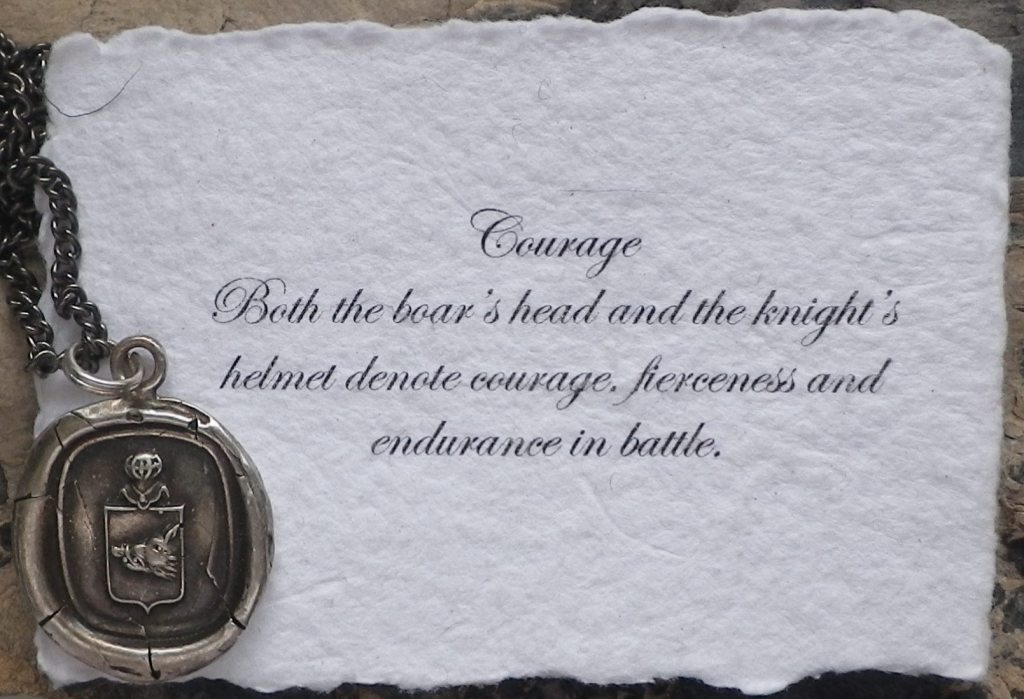
Courage
Both the boar’s head and the knight’s helmet denote courage, fierceness and endurance in battle.
2017 01 16: Condolences from Ireland on Supreme Court of Canada Ernst vs AER ruling damaging our civil Canadian Charter Rights and protecting abuse of power by the Alberta Energy Regulator:
We’re winning here because of you. When you told your story in the ballroom of romance in Glenfarne that night you turned the tide against the fracking industry. We’re going to ban fracking this year but you banned it first in the hearts of those local people. They believed you because of you honestly and your integrity. And you did it with Love.
We appreciate you. You reminded us to fight in a way that represented our values. That’s why we’re winning.
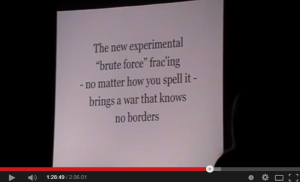
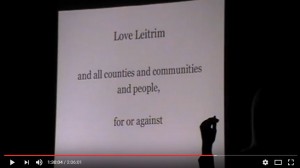
Slides from Ernst’s 2012 presentation in Glenfarne, Co Leitrim
Refer also to: Jessica Ernst packs hall at Ballroom of Romance
But this was no social outing that saw a full house of up to 350 people on Friday 24th February spilling out the door. … The men at the door were straining as if there lives depended on it, because it did. …
BREAKING: Dáil backs Sligo-Leitrim TD’s bill to ban fracking in Ireland by Leitrim Observer Reporter, 31 May 2017
In breaking news the Dáil has voted to support Sligo/Leitrim TD, Tony McLoughlin’s bill to ban the process of hydraulic fracturing (fracking) in Ireland.
After six years of lobbying, presentation, demonstrations, petitions and publicity events, campaigners against fracking have succeeded in getting a private members Bill through the final stage of process in the Dáil.
This morning, after just over an hour of debate, the Petroleum and other Minerals Development (prohibition of Onshore Hydraulic Fracturing ) Bill 2016 was passed.
There were rounds of applause in the Dáil chamber and sighs of relief around Leitrim as the anti-fracking bill was passed and sent to the Seanad.
Bill banning onshore fracking passed in Dáil, Sinn Féin called it a victory “for communities and common sense” May 31, 2017, Newstalk
A Fine Gael anti-fracking Bill is the first Private Members’ Bill to be passed by the current Dáil.
Deputy Tony McLoughlin, who represents Sligo-Leitrim, said his Bill will protect hundreds of thousands of people from the effects of hydraulic fracking.
Speaking following its passing, Deputy McLoughlin said: “This Bill will ensure that the environment and communities in the West and North West of Ireland are protected from the effects of hydraulic fracking, so this is a special moment for me and the people I was elected to represent.
“The scientific evidence overwhelmingly shows that permitting fracking in Ireland and Northern Ireland would pose significant threats to the air, water and the health and safety of individuals and communities here.
“If it was ever permitted to occur in Ireland, counties such as Sligo, Leitrim, Roscommon, Donegal, Cavan, Monaghan and Clare could end up seeing damaging effects like many effected cities and towns in the United States, many of which I must add have now decided to implemented similar bans to the one before us.
“On this basis, it ultimately must be seen as a serious public health and environmental concern for tens of thousands of people in the Republic of Ireland.”
Reaction
Sinn Féin Spokesperson for the Environment Brain Stanley TD welcomed the ban but said more complex legislation is needed to ensure it is not challenged.
“With the possible environmental implications for fracking on various parts of this State, it is very welcome that this Bill progresses,” he said. ”
This ban is a victory for the long term, considering the communities and the tourism of the areas that would be affected.
“However, this does not cater for offshore fracking which is possible under the present law. There are question marks over the environmental implications of this form of offshore extraction but a one line amendment in the present legislation maybe challenged in the future.
“To ensure an effective environmental protection regime, we realise to ban offshore fracking needs a larger piece of legislation.”
… It is estimated to have offered gas security to the US and Canada for about 100 years, and has presented an opportunity to generate electricity at half the CO2 emissions of coal. [Two big lies pimped by industry and it’s corrupt enabling “regulators,” often repeated in the mainstream media. Frac’ing has been proven to create more emissions than coal]
However, fracking uses huge amounts of water, which must be transported to the fracking site, at significant environmental cost.
Environmentalists say potentially carcinogenic chemicals used may escape and contaminate groundwater around the fracking site. The industry suggests pollution incidents are the results of bad practice, rather than an inherently risky technique. [When will industry’s and it’s enablers’ lies stop?]
There are also worries that the fracking process can cause small [and large] earth tremors [that don’t stop even after the frac’ing is stopped. Emphasis added]
Comment Charlie Williams sent in to Newstalk
Good news! And bad journalism: “It is estimated to have offered gas security to the US and Canada for about 100 years, and has presented an opportunity to generate electricity at half the CO2 emissions of coal.” These are two myths in one single sentence. All disproved umpteen times in the Shale Gas Bulletin Ireland. Fracked wells deplete much faster than conventional sources, and the carbon footprint of shale gas (in particular for electricity generation) is no better than coal due to vast Methane emissions.

Group calls latest step towards fracking ban in Ireland ‘a victory for the global climate movement’ by BreakingNews, May 31, 2017
New laws to outlaw onshore drilling for shale gas from rocks, sands and coal seams have passed the latest stage in the Dáil.
The ban is expected to come into effect in the middle of the summer.
Kate Ruddock, Friends of the Earth Ireland’s deputy director, said it was a great victory for local campaigners.
“It’s also a victory for the global climate movement. All around the world communities are campaigning to keep fossil fuels in the ground and to put citizens at the heart of a new, clean, healthy energy system,” she said.
“This victory is a tribute to their solidarity and is a shot in the arm for our common cause of a fossil-free future.”
Hydraulic fracturing, commonly known as fracking, involves drilling into the earth before a high-pressure water mixture is forced into rock to release gas.
The legislation secured cross-party support in the Dáil.
Tony McLoughlin, TD for Sligo-Leitrim where the prospect of fracking faced a groundswell of popular opposition, said: “It could not be clearer that it is a very necessary law that has been heavily scrutinised and continually improved.
“The scientific evidence overwhelmingly shows that permitting fracking in Ireland and Northern Ireland would pose significant threats to the air, water and the health and safety of individuals and communities here.”
Eddie Mitchell, spokesman for Love Leitrim which helped to spearhead the anti-fracking campaign, said:
“It’s hugely significant for communities like us who have taken on the fracking industry.
“But we don’t feel we can sit still yet. We have done this on the back of opposition in Northern Ireland. The situation has not changed there.
“They are still trying to get fracking there. We can’t rest until we get support for these communities. We have put down a marker but we owe it to them.”
Ms Ruddock added: “Ireland has a reputation as a climate laggard and too often our lack of climate action is a cause of embarrassment internationally, but today we can be proud of our parliament for putting Ireland in the vanguard of the movement to ban fracking.”
A Dáil committee which assessed the legislation earlier this month found that fracking would create the potential for groundwater contamination, leaks and surface chemical spills.
It also said that uncertainty over how much greenhouse gas is produced by the industry is reason enough to ban it and that a “vigorous regulatory regime” may not be enough to prevent pollution.
The legislation is expected to pass its final hurdle in the Seanad in the coming weeks.
Three exploratory licences were granted in Ireland in 2011 for fracking, but no extraction has taken place.
France, Bulgaria, the Czech Republic and Germany have all banned fracking. [Emphasis added]
[Refer also to:
2016 12 20: The only safe fracking regulation is a ban
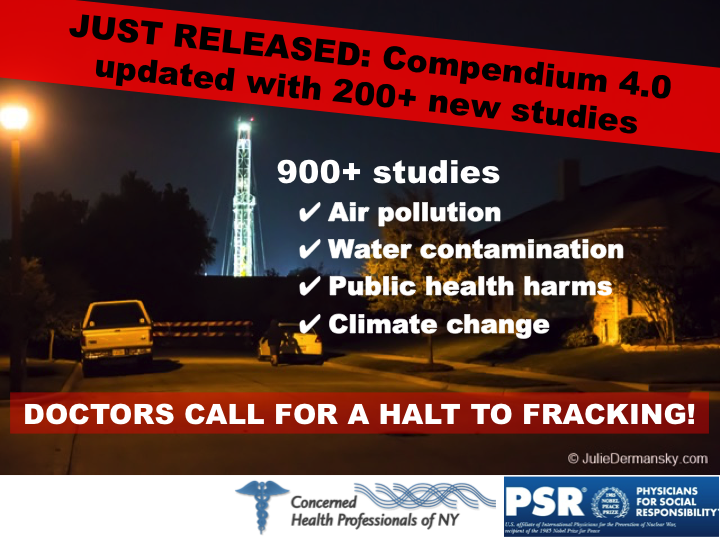
Anthony Ingraffea, PhD, Dwight C. Baum Professor of Engineering, Cornell University, said, “In 2008*, when New York State first declared a moratorium on fracking, only six peer-reviewed papers on the health and environmental impacts had been published. Now there are more than 400, and the vast majority show a clear and present danger. What’s more, many problems are unfixable by regulations of any kind.”
“By any responsible account,” Chief Justice Castille wrote, “the exploitation of the Marcellus Shale Formation will produce a detrimental effect on the environment, on the people, their children, and the future generations, and potentially on the public purse, perhaps rivaling the environmental effects of coal extraction.”
2012 03 06: Jessica Ernst packs hall at Ballroom of Romance
Ernst argues that Ireland should “do a conservative socio-economic assessment of what Ireland stands to lose — in current jobs, industry, your infrastructure, your health. And even the water itself. What is the value of Ireland’s rivers and loughs? Often in these things, we look at the supposed short-term gains, but we don’t look at what we put at risk.”
When asked what she would suggest as a course of action for Ireland on fracking, her message is simple: wait. “The best advice I can give to people in Ireland is that the wise man learns from the mistakes of others. Watch the mistakes happen everywhere else,” she says. [Emphasis added]
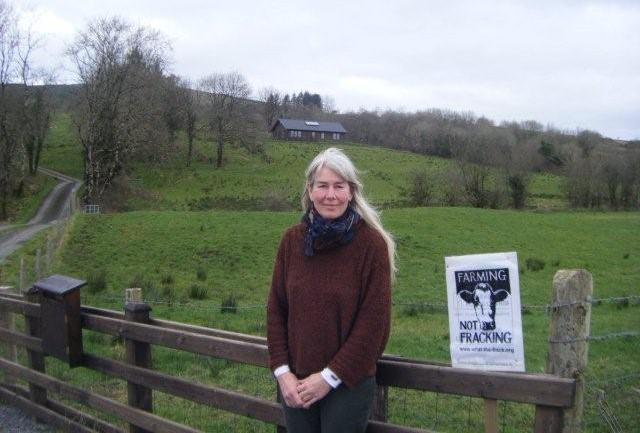
Jessica Ernst in front of Tawnylust, Leitrim Co, Republic of Ireland, passive solar B&B where she was hosted during part of her 2012 speaking tour
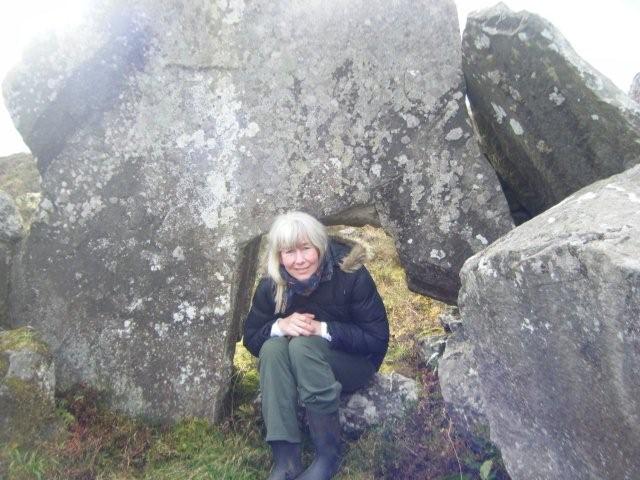
Jessica Ernst in borrowed boots at Prince Conaills Grave near Kiltyclogher in Leitrim Co, Republic of Ireland
The Irish did not allow themselves to by synergized by the industry and its enablers.
2011 06 30: France Becomes First Country to Ban Extraction of Natural Gas by Fracking

